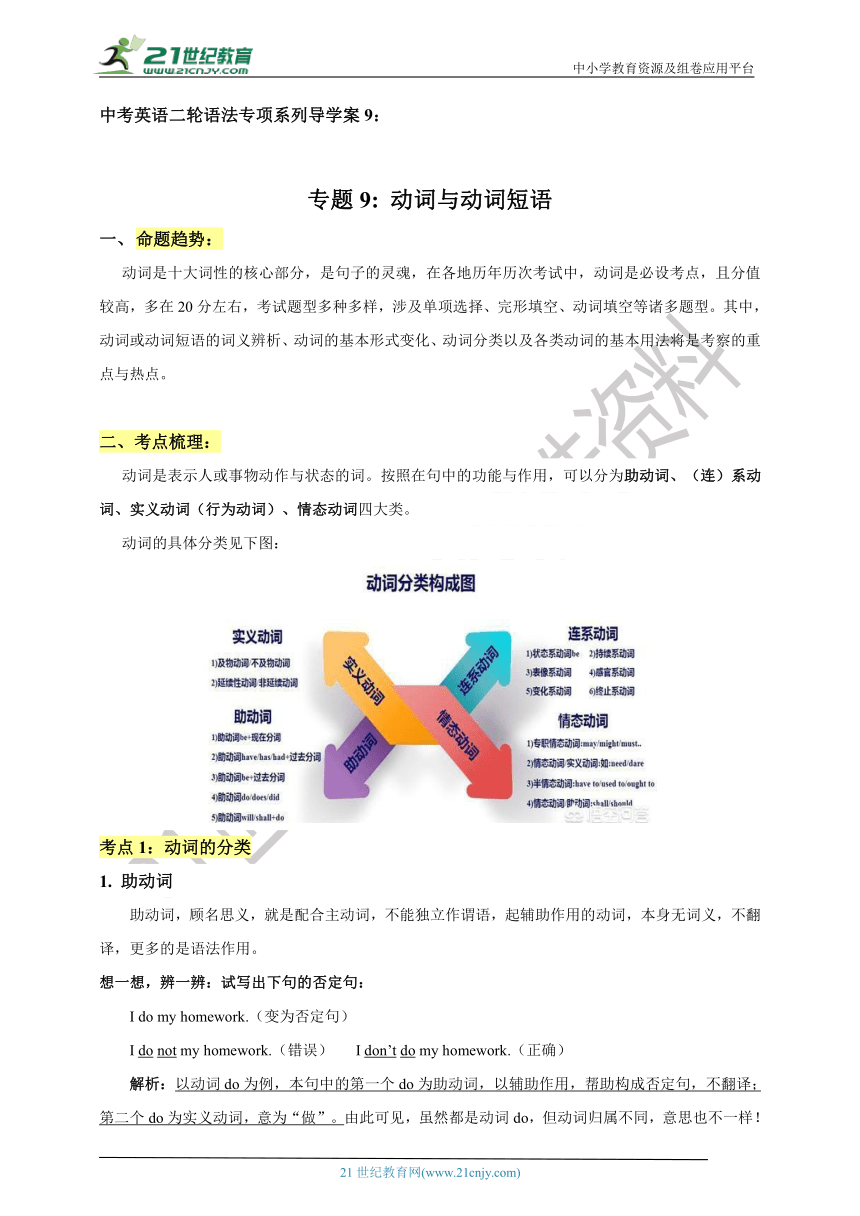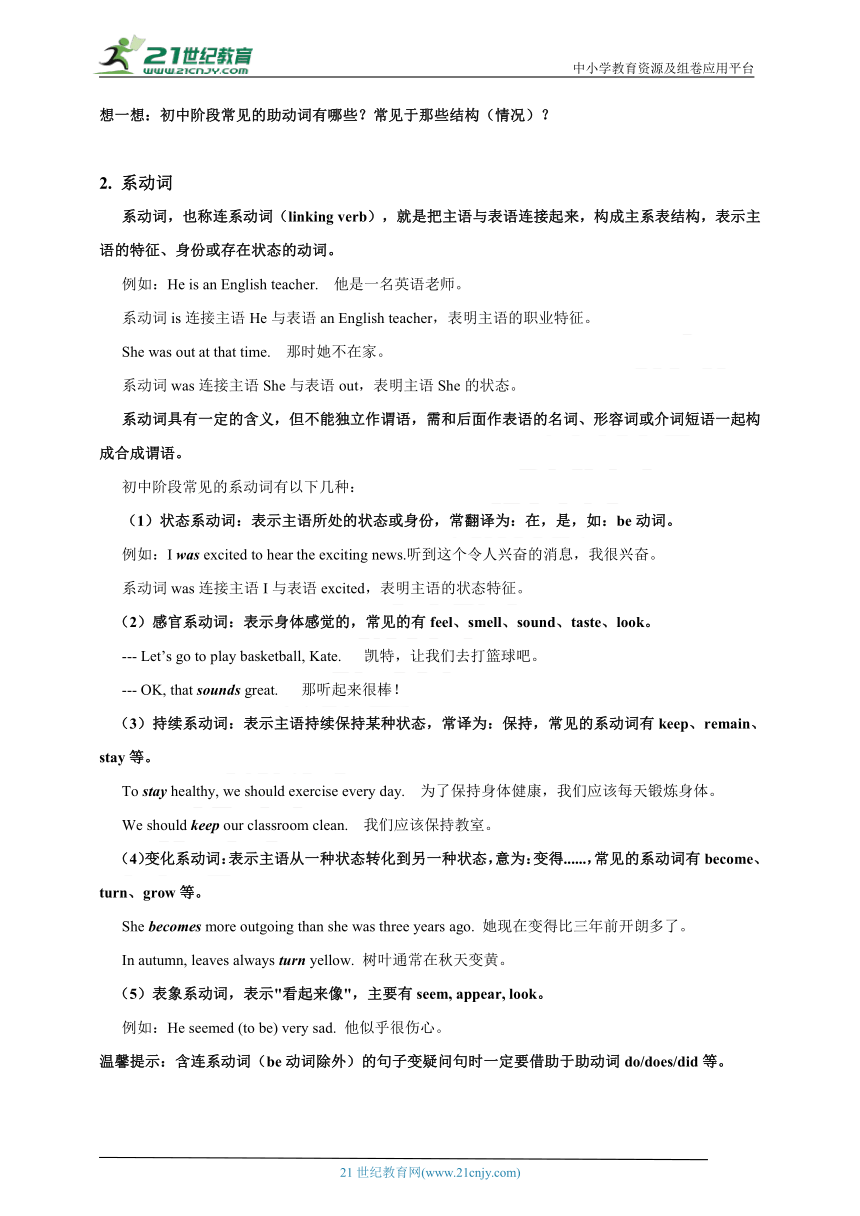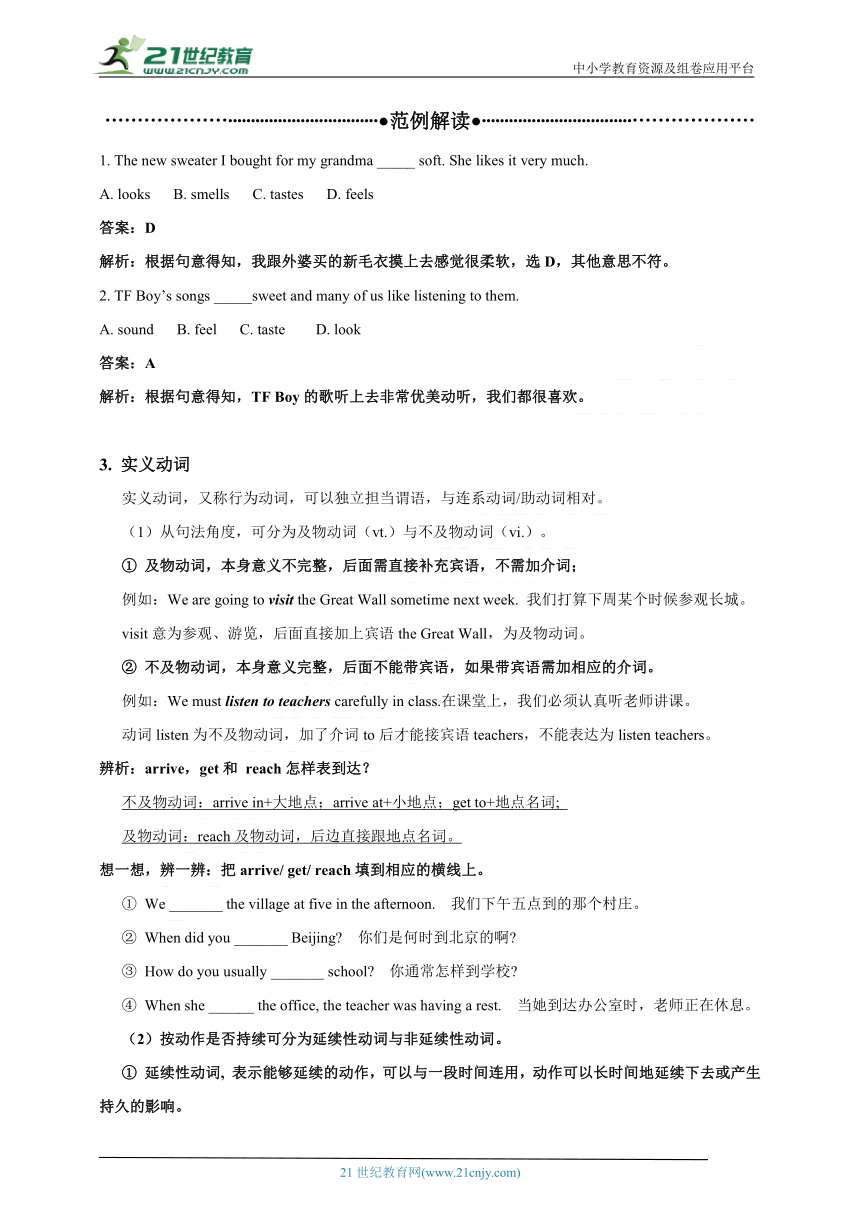中考英语二轮语法专项系列导学案9: 动词与动词短语
文档属性
| 名称 | 中考英语二轮语法专项系列导学案9: 动词与动词短语 |

|
|
| 格式 | zip | ||
| 文件大小 | 1007.8KB | ||
| 资源类型 | 试卷 | ||
| 版本资源 | 人教新目标(Go for it)版 | ||
| 科目 | 英语 | ||
| 更新时间 | 2019-07-25 20:27:32 | ||
图片预览




文档简介
中小学教育资源及组卷应用平台
中考英语二轮语法专项系列导学案9:
专题9: 动词与动词短语
命题趋势:
动词是十大词性的核心部分,是句子的灵魂,在各地历年历次考试中,动词是必设考点,且分值较高,多在20分左右,考试题型多种多样,涉及单项选择、完形填空、动词填空等诸多题型。其中,动词或动词短语的词义辨析、动词的基本形式变化、动词分类以及各类动词的基本用法将是考察的重点与热点。
二、考点梳理:
动词是表示人或事物动作与状态的词。按照在句中的功能与作用,可以分为助动词、(连)系动词、实义动词(行为动词)、情态动词四大类。
动词的具体分类见下图:
考点1:动词的分类
1. 助动词
助动词,顾名思义,就是配合主动词,不能独立作谓语,起辅助作用的动词,本身无词义,不翻译,更多的是语法作用。
想一想,辨一辨:试写出下句的否定句:
I do my homework.(变为否定句)
I do not my homework.(错误) I don’t do my homework.(正确)
解析:以动词do为例,本句中的第一个do为助动词,以辅助作用,帮助构成否定句,不翻译;第二个do为实义动词,意为“做”。由此可见,虽然都是动词do,但动词归属不同,意思也不一样!
初中阶段主要的助动词有be, have, has, had, do, does, did, will, shall等,为方便记忆,可分为四大类:
第一类:助动词be;
第二类:助动词have/has/had,常见于各种完成时态;
第三类:助动词do/does/did,用法广泛,多用途。
第四类:助动词will和 shall;
具体运用常见于下列结构(情况):
(1)“助动词be +现在分词doing”构成的各种进行时态。
例如:The teachers are having a meeting.老师们正在开会。
We asked him what he was doing at that time 我们问他那时他在做什么。
(2)“助动词be+过去分词”构成被动语态。
例如: The textbook was put on the teachers’ desk by his mother教科书被老师放在讲桌上。
The invitation was received yesterday. 昨天收到请帖的。
温馨提示:be为兼类词,即可为系动词,也可作助动词,具体情况具体分析。
(3)助动词have/has/had+过去分词,构成各种完成时态。
He has lived in China since he was eight years old. 自八岁以来,他一直住在中国。
(4)助动词do/ does/did用于构成疑问句、倒装句、否定句、加强说话的语气及替代前面刚出现的动词以避免重复等。
试记忆下列例句中助动词do/ does/did的作用。
例如: ① Do you live in China? 你住在中国吗?(用于构成疑问句)
② ---Who cleaned the room?
---Lucy did.
谁打扫的房间?Lucy打扫的。(替代前面刚出现的动词以避免重复)
③ He didn't go to see the movie last Sunday. 上星期天他没去看电影。(用于构成否定句)
④ Do remember the words,children! 孩子们,请务必记住这些单词!(加强说话的语气)
⑤ Only then did I realize it. 直到那时我才意识到这一点。(用于构成倒装句)
(5)助动词will和 shall 用于构成将来时。( shall仅用于第一人称,will可用于各种人称)
例如:There will be more trees in one hundred years.一百年后将有更多的树。
I shall be fifteen years old next birthday到下一个生日,我就15岁了。
想一想:初中阶段常见的助动词有哪些?常见于那些结构(情况)?
2. 系动词
系动词,也称连系动词(linking verb),就是把主语与表语连接起来,构成主系表结构,表示主语的特征、身份或存在状态的动词。
例如:He is an English teacher. 他是一名英语老师。
系动词is连接主语He与表语an English teacher,表明主语的职业特征。
She was out at that time. 那时她不在家。
系动词was连接主语She与表语out,表明主语She的状态。
系动词具有一定的含义,但不能独立作谓语,需和后面作表语的名词、形容词或介词短语一起构成合成谓语。
初中阶段常见的系动词有以下几种:
(1)状态系动词:表示主语所处的状态或身份,常翻译为:在,是,如:be动词。
例如:I was excited to hear the exciting news.听到这个令人兴奋的消息,我很兴奋。
系动词was连接主语I与表语excited,表明主语的状态特征。
(2)感官系动词:表示身体感觉的,常见的有feel、smell、sound、taste、look。
--- Let’s go to play basketball, Kate. 凯特,让我们去打篮球吧。
--- OK, that sounds great. 那听起来很棒!
(3)持续系动词:表示主语持续保持某种状态,常译为:保持,常见的系动词有keep、remain、stay等。
To stay healthy, we should exercise every day. 为了保持身体健康,我们应该每天锻炼身体。
We should keep our classroom clean. 我们应该保持教室。
(4)变化系动词:表示主语从一种状态转化到另一种状态,意为:变得......,常见的系动词有become、turn、grow等。
She becomes more outgoing than she was three years ago. 她现在变得比三年前开朗多了。
In autumn, leaves always turn yellow. 树叶通常在秋天变黄。
(5)表象系动词,表示"看起来像",主要有seem, appear, look。
例如:He seemed (to be) very sad. 他似乎很伤心。
温馨提示:含连系动词(be动词除外)的句子变疑问句时一定要借助于助动词do/does/did等。
?????????????????????????????????????????????????????范例解读?????????????????????????????????????????????????????
1. The new sweater I bought for my grandma _____ soft. She likes it very much.
A. looks B. smells C. tastes D. feels
答案:D
解析:根据句意得知,我跟外婆买的新毛衣摸上去感觉很柔软,选D,其他意思不符。
2. TF Boy’s songs _____sweet and many of us like listening to them.
A. sound B. feel C. taste D. look
答案:A
解析:根据句意得知,TF Boy的歌听上去非常优美动听,我们都很喜欢。
3. 实义动词
实义动词,又称行为动词,可以独立担当谓语,与连系动词/助动词相对。
(1)从句法角度,可分为及物动词(vt.)与不及物动词(vi.)。
① 及物动词,本身意义不完整,后面需直接补充宾语,不需加介词;
例如:We are going to visit the Great Wall sometime next week. 我们打算下周某个时候参观长城。
visit意为参观、游览,后面直接加上宾语the Great Wall,为及物动词。
② 不及物动词,本身意义完整,后面不能带宾语,如果带宾语需加相应的介词。
例如:We must listen to teachers carefully in class.在课堂上,我们必须认真听老师讲课。
动词listen为不及物动词,加了介词to后才能接宾语teachers,不能表达为listen teachers。
辨析:arrive,get和 reach怎样表到达?
不及物动词:arrive in+大地点;arrive at+小地点;get to+地点名词;
及物动词:reach及物动词,后边直接跟地点名词。
想一想,辨一辨:把arrive/ get/ reach填到相应的横线上。
① We _______ the village at five in the afternoon. 我们下午五点到的那个村庄。
② When did you _______ Beijing? 你们是何时到北京的啊?
③ How do you usually _______ school? 你通常怎样到学校?
④ When she ______ the office, the teacher was having a rest. 当她到达办公室时,老师正在休息。
(2)按动作是否持续可分为延续性动词与非延续性动词。
① 延续性动词, 表示能够延续的动作,可以与一段时间连用,动作可以长时间地延续下去或产生持久的影响。
例如:We have studied English for six years.我们已经学习英语六年了。
② 非延续性动词表示动作瞬间完成,即动作一经发生即结束,不能和表示一段时间的状语连用。例如:begin, buy, come, die, find, go, join, lend, leave. sell borrow等。
?????????????????????????????????????????????????????范例解读?????????????????????????????????????????????????????
1. --- How long can I _____ the book Journey to the West?
--- For two weeks.
A. borrow B. lend C. return D. keep
答案:D
解析:how long引导的特殊疑问句不与短暂动词连用,只能用延续性动词,borrow、lend与return均为短暂动词,选D。
2. ---How long have you _____?
---For almost ten years.
A. owned this garden B. bought this car C. arrived in Shanghai D. come to this town
答案:A
解析:how long引导的特殊疑问句不与短暂动词连用,只能用延续性动词,bought、arrived与come均为短暂动词,排除,选A。
4. 情态动词
情态动词表达说话人的某种语气,具有一定的词义,并不表示动作或状态,后接动词原形构成句子的合成谓语。(详细解读请参见专题十)
?????????????????????????????????????????????????????学以致用?????????????????????????????????????????????????????
1. I really enjoy the noodles and vegetables. They _____ delicious.
A. stay B. feel C. taste D. sound
2. ---She said she returned the book to the library.
---I’m sure she ____.
A. is B. was C. takes D. did
3. ---Do you know why he didn’t _____a word when he ____ to.
---Because he was too nervous
A. speak, speaks B. say, was spoken C. say, spoke D. speak, is spoken
考点2:动词或动词短语的词义辨析
近几年,各地中考对动词或动词短语的考查主要涉及语境内的词义辨析,这就需要认真阅读题干,仔细辨别各选项的不同含义,然后选出与题干相符正确的选项。
近义词辨析在近几年的中考中较少涉及到,但是在写作中常常面临遣词造句的问题,所以掌握常见的近义词的用法也是很有必要的。
动词短语是动词的固定搭配形式,种类很多,常见的动词短语结构有:
(1)动词十介词 (宾语只能放在介词后);
例如:She often helps me to look after our children when I am away.
当我不在家时,她常帮我照看孩子
(2)动词+副词 (宾语是名词时,放于副词前后皆可,位置比较灵活;宾语是代词时,则只能放于动词和副词之间);
例如:Please wake me up at six.请在六点叫醒我。
想一想,练一练:
There was a big fire in the street last night, but the firemen _____ within twenty minutes.
A. took it out B. took out it C. put it out D. put out it
(3)动词+副词十介词 (宾语只能放在介词后);
例如:We must come up with a good idea to solve the problem.我们必须相处一个好主意来解决这个问题。
(4)动词十名词十介词 (宾语只能放在介词后);
例如:His job is to take care of the patients.他的任务是照看病人。
?????????????????????????????????????????????????????范例解读?????????????????????????????????????????????????????
1. Our team was ______ in today’s important basketball match.
A. won B. beaten C. failed D. succeeded
答案:B
解析: 动词词义辨析题。根据句意得知,我们篮球队在今天这场重要的比赛中被打败了。beat意为战胜打败,后跟人或组织,其他意思不符。
2. Our country is taking action to _______air pollution.
A. cut down B. cut up C. cut out D. cut off
答案:A
解析: 本題考查动词短语词义辨析。根据句意得知,我们的国家正采取措施以减少空气污染。 cut down“减少"; cut up"“切碎”; cut out“删除”; cut off“切断”。结合句意可知选A。
3. --- May I speak to Mr. White?
--- _______, please. Here he comes.
A. Hang out B. Pick up C. Take up D. Hold on
答案:D
解析: 本题考查动词短语词义辨析。根据句意得知,我可以和怀特先生通话吗?请稍等,他过来了。
?????????????????????????????????????????????????????学以致用?????????????????????????????????????????????????????
1. ---Alice, could you help me _____ the meat? I want to make some dumplings for dinner.
---OK. I’ll do it right away.
A. put up B. give up C. use up D. cut up
2. --- Could I _____ your ipad, Alice?
--- Of course. Here you are.
A. lend B. keep C. borrow D. return
3. Smoking is bad for your health. You'd better ______.
A set it up B. give it up C. pick it up D. give it up
4. If you want to know more information about the coming party, please ____ our website.
A. set up B. look through C. pick out D turn off
5. ---How much is the ticket to Central Park?
---A one-way ticket ____? 30, and you can ______ another ? 15 for a round-trip.
A costs, pay B. cost, spend C. pay; spend D. spends, pay
三、真题感悟练:
1. Listen! The whole class is quiet now. It _____ that everyone falls asleep.
A. seems B. looks C. sounds D. gets
2. ---How long do you think the terrible weather will _____?
---Why not listen to the weather report?
A. appear B. last C. change D. discover
3. ---Do you think Houston Rockets will beat Lakers?
---Yes, They have better players, so I _____ them to win.
A. hope B. think C. depend D. expect
4. ---why is Lily so popular among the students?
---Because she often ____ us with help and care.
A. gives B. offers C. provides D. supports
5. The old man's eyesight isn't very good. He often ____Tim for Jim.
A. regards B. treats C. mistakes D. thinks
6. After the serious illness, he finally ______ how important health is!
A. realized B. meant C. added D. impressed
7. The energy from the sun and wind is very cheap and it will never _____.
A. come out B. put out C. carry out D. run out
8. I need to _____with some ways of getting money, or I’ll have to stop.
A. pick up B. come up C take up D. set up
9. We have to ______the bike ride because of the bad weather.
A. put off B. turn off C. take off D. get off
10. ---I hope to be a volunteer on weekends.
---You could help to _____the city parks.
A. cheer up B. make up C. take up D. clean up
参考答案:
考点1: 1. C 2. D 3. B
参考答案:①arrived at; get to ② arrive in; get to; reached ③ get to; reached ④ reached; arrived at;
考点2: 1. D 2. C 3. D 4. B 5. A
想一想,练一练:
解析:根据句意得知,消防员在20分钟内扑灭大火,且代词it必须放中间,故选C。
真题提升练: 1. A 2. B 3. D 4. C 5. C 6. A 7. D 8. B 9. A 10. D
21世纪教育网 www.21cnjy.com 精品试卷·第 2 页 (共 2 页)
21世纪教育网(www.21cnjy.com)
中考英语二轮语法专项系列导学案9:
专题9: 动词与动词短语
命题趋势:
动词是十大词性的核心部分,是句子的灵魂,在各地历年历次考试中,动词是必设考点,且分值较高,多在20分左右,考试题型多种多样,涉及单项选择、完形填空、动词填空等诸多题型。其中,动词或动词短语的词义辨析、动词的基本形式变化、动词分类以及各类动词的基本用法将是考察的重点与热点。
二、考点梳理:
动词是表示人或事物动作与状态的词。按照在句中的功能与作用,可以分为助动词、(连)系动词、实义动词(行为动词)、情态动词四大类。
动词的具体分类见下图:
考点1:动词的分类
1. 助动词
助动词,顾名思义,就是配合主动词,不能独立作谓语,起辅助作用的动词,本身无词义,不翻译,更多的是语法作用。
想一想,辨一辨:试写出下句的否定句:
I do my homework.(变为否定句)
I do not my homework.(错误) I don’t do my homework.(正确)
解析:以动词do为例,本句中的第一个do为助动词,以辅助作用,帮助构成否定句,不翻译;第二个do为实义动词,意为“做”。由此可见,虽然都是动词do,但动词归属不同,意思也不一样!
初中阶段主要的助动词有be, have, has, had, do, does, did, will, shall等,为方便记忆,可分为四大类:
第一类:助动词be;
第二类:助动词have/has/had,常见于各种完成时态;
第三类:助动词do/does/did,用法广泛,多用途。
第四类:助动词will和 shall;
具体运用常见于下列结构(情况):
(1)“助动词be +现在分词doing”构成的各种进行时态。
例如:The teachers are having a meeting.老师们正在开会。
We asked him what he was doing at that time 我们问他那时他在做什么。
(2)“助动词be+过去分词”构成被动语态。
例如: The textbook was put on the teachers’ desk by his mother教科书被老师放在讲桌上。
The invitation was received yesterday. 昨天收到请帖的。
温馨提示:be为兼类词,即可为系动词,也可作助动词,具体情况具体分析。
(3)助动词have/has/had+过去分词,构成各种完成时态。
He has lived in China since he was eight years old. 自八岁以来,他一直住在中国。
(4)助动词do/ does/did用于构成疑问句、倒装句、否定句、加强说话的语气及替代前面刚出现的动词以避免重复等。
试记忆下列例句中助动词do/ does/did的作用。
例如: ① Do you live in China? 你住在中国吗?(用于构成疑问句)
② ---Who cleaned the room?
---Lucy did.
谁打扫的房间?Lucy打扫的。(替代前面刚出现的动词以避免重复)
③ He didn't go to see the movie last Sunday. 上星期天他没去看电影。(用于构成否定句)
④ Do remember the words,children! 孩子们,请务必记住这些单词!(加强说话的语气)
⑤ Only then did I realize it. 直到那时我才意识到这一点。(用于构成倒装句)
(5)助动词will和 shall 用于构成将来时。( shall仅用于第一人称,will可用于各种人称)
例如:There will be more trees in one hundred years.一百年后将有更多的树。
I shall be fifteen years old next birthday到下一个生日,我就15岁了。
想一想:初中阶段常见的助动词有哪些?常见于那些结构(情况)?
2. 系动词
系动词,也称连系动词(linking verb),就是把主语与表语连接起来,构成主系表结构,表示主语的特征、身份或存在状态的动词。
例如:He is an English teacher. 他是一名英语老师。
系动词is连接主语He与表语an English teacher,表明主语的职业特征。
She was out at that time. 那时她不在家。
系动词was连接主语She与表语out,表明主语She的状态。
系动词具有一定的含义,但不能独立作谓语,需和后面作表语的名词、形容词或介词短语一起构成合成谓语。
初中阶段常见的系动词有以下几种:
(1)状态系动词:表示主语所处的状态或身份,常翻译为:在,是,如:be动词。
例如:I was excited to hear the exciting news.听到这个令人兴奋的消息,我很兴奋。
系动词was连接主语I与表语excited,表明主语的状态特征。
(2)感官系动词:表示身体感觉的,常见的有feel、smell、sound、taste、look。
--- Let’s go to play basketball, Kate. 凯特,让我们去打篮球吧。
--- OK, that sounds great. 那听起来很棒!
(3)持续系动词:表示主语持续保持某种状态,常译为:保持,常见的系动词有keep、remain、stay等。
To stay healthy, we should exercise every day. 为了保持身体健康,我们应该每天锻炼身体。
We should keep our classroom clean. 我们应该保持教室。
(4)变化系动词:表示主语从一种状态转化到另一种状态,意为:变得......,常见的系动词有become、turn、grow等。
She becomes more outgoing than she was three years ago. 她现在变得比三年前开朗多了。
In autumn, leaves always turn yellow. 树叶通常在秋天变黄。
(5)表象系动词,表示"看起来像",主要有seem, appear, look。
例如:He seemed (to be) very sad. 他似乎很伤心。
温馨提示:含连系动词(be动词除外)的句子变疑问句时一定要借助于助动词do/does/did等。
?????????????????????????????????????????????????????范例解读?????????????????????????????????????????????????????
1. The new sweater I bought for my grandma _____ soft. She likes it very much.
A. looks B. smells C. tastes D. feels
答案:D
解析:根据句意得知,我跟外婆买的新毛衣摸上去感觉很柔软,选D,其他意思不符。
2. TF Boy’s songs _____sweet and many of us like listening to them.
A. sound B. feel C. taste D. look
答案:A
解析:根据句意得知,TF Boy的歌听上去非常优美动听,我们都很喜欢。
3. 实义动词
实义动词,又称行为动词,可以独立担当谓语,与连系动词/助动词相对。
(1)从句法角度,可分为及物动词(vt.)与不及物动词(vi.)。
① 及物动词,本身意义不完整,后面需直接补充宾语,不需加介词;
例如:We are going to visit the Great Wall sometime next week. 我们打算下周某个时候参观长城。
visit意为参观、游览,后面直接加上宾语the Great Wall,为及物动词。
② 不及物动词,本身意义完整,后面不能带宾语,如果带宾语需加相应的介词。
例如:We must listen to teachers carefully in class.在课堂上,我们必须认真听老师讲课。
动词listen为不及物动词,加了介词to后才能接宾语teachers,不能表达为listen teachers。
辨析:arrive,get和 reach怎样表到达?
不及物动词:arrive in+大地点;arrive at+小地点;get to+地点名词;
及物动词:reach及物动词,后边直接跟地点名词。
想一想,辨一辨:把arrive/ get/ reach填到相应的横线上。
① We _______ the village at five in the afternoon. 我们下午五点到的那个村庄。
② When did you _______ Beijing? 你们是何时到北京的啊?
③ How do you usually _______ school? 你通常怎样到学校?
④ When she ______ the office, the teacher was having a rest. 当她到达办公室时,老师正在休息。
(2)按动作是否持续可分为延续性动词与非延续性动词。
① 延续性动词, 表示能够延续的动作,可以与一段时间连用,动作可以长时间地延续下去或产生持久的影响。
例如:We have studied English for six years.我们已经学习英语六年了。
② 非延续性动词表示动作瞬间完成,即动作一经发生即结束,不能和表示一段时间的状语连用。例如:begin, buy, come, die, find, go, join, lend, leave. sell borrow等。
?????????????????????????????????????????????????????范例解读?????????????????????????????????????????????????????
1. --- How long can I _____ the book Journey to the West?
--- For two weeks.
A. borrow B. lend C. return D. keep
答案:D
解析:how long引导的特殊疑问句不与短暂动词连用,只能用延续性动词,borrow、lend与return均为短暂动词,选D。
2. ---How long have you _____?
---For almost ten years.
A. owned this garden B. bought this car C. arrived in Shanghai D. come to this town
答案:A
解析:how long引导的特殊疑问句不与短暂动词连用,只能用延续性动词,bought、arrived与come均为短暂动词,排除,选A。
4. 情态动词
情态动词表达说话人的某种语气,具有一定的词义,并不表示动作或状态,后接动词原形构成句子的合成谓语。(详细解读请参见专题十)
?????????????????????????????????????????????????????学以致用?????????????????????????????????????????????????????
1. I really enjoy the noodles and vegetables. They _____ delicious.
A. stay B. feel C. taste D. sound
2. ---She said she returned the book to the library.
---I’m sure she ____.
A. is B. was C. takes D. did
3. ---Do you know why he didn’t _____a word when he ____ to.
---Because he was too nervous
A. speak, speaks B. say, was spoken C. say, spoke D. speak, is spoken
考点2:动词或动词短语的词义辨析
近几年,各地中考对动词或动词短语的考查主要涉及语境内的词义辨析,这就需要认真阅读题干,仔细辨别各选项的不同含义,然后选出与题干相符正确的选项。
近义词辨析在近几年的中考中较少涉及到,但是在写作中常常面临遣词造句的问题,所以掌握常见的近义词的用法也是很有必要的。
动词短语是动词的固定搭配形式,种类很多,常见的动词短语结构有:
(1)动词十介词 (宾语只能放在介词后);
例如:She often helps me to look after our children when I am away.
当我不在家时,她常帮我照看孩子
(2)动词+副词 (宾语是名词时,放于副词前后皆可,位置比较灵活;宾语是代词时,则只能放于动词和副词之间);
例如:Please wake me up at six.请在六点叫醒我。
想一想,练一练:
There was a big fire in the street last night, but the firemen _____ within twenty minutes.
A. took it out B. took out it C. put it out D. put out it
(3)动词+副词十介词 (宾语只能放在介词后);
例如:We must come up with a good idea to solve the problem.我们必须相处一个好主意来解决这个问题。
(4)动词十名词十介词 (宾语只能放在介词后);
例如:His job is to take care of the patients.他的任务是照看病人。
?????????????????????????????????????????????????????范例解读?????????????????????????????????????????????????????
1. Our team was ______ in today’s important basketball match.
A. won B. beaten C. failed D. succeeded
答案:B
解析: 动词词义辨析题。根据句意得知,我们篮球队在今天这场重要的比赛中被打败了。beat意为战胜打败,后跟人或组织,其他意思不符。
2. Our country is taking action to _______air pollution.
A. cut down B. cut up C. cut out D. cut off
答案:A
解析: 本題考查动词短语词义辨析。根据句意得知,我们的国家正采取措施以减少空气污染。 cut down“减少"; cut up"“切碎”; cut out“删除”; cut off“切断”。结合句意可知选A。
3. --- May I speak to Mr. White?
--- _______, please. Here he comes.
A. Hang out B. Pick up C. Take up D. Hold on
答案:D
解析: 本题考查动词短语词义辨析。根据句意得知,我可以和怀特先生通话吗?请稍等,他过来了。
?????????????????????????????????????????????????????学以致用?????????????????????????????????????????????????????
1. ---Alice, could you help me _____ the meat? I want to make some dumplings for dinner.
---OK. I’ll do it right away.
A. put up B. give up C. use up D. cut up
2. --- Could I _____ your ipad, Alice?
--- Of course. Here you are.
A. lend B. keep C. borrow D. return
3. Smoking is bad for your health. You'd better ______.
A set it up B. give it up C. pick it up D. give it up
4. If you want to know more information about the coming party, please ____ our website.
A. set up B. look through C. pick out D turn off
5. ---How much is the ticket to Central Park?
---A one-way ticket ____? 30, and you can ______ another ? 15 for a round-trip.
A costs, pay B. cost, spend C. pay; spend D. spends, pay
三、真题感悟练:
1. Listen! The whole class is quiet now. It _____ that everyone falls asleep.
A. seems B. looks C. sounds D. gets
2. ---How long do you think the terrible weather will _____?
---Why not listen to the weather report?
A. appear B. last C. change D. discover
3. ---Do you think Houston Rockets will beat Lakers?
---Yes, They have better players, so I _____ them to win.
A. hope B. think C. depend D. expect
4. ---why is Lily so popular among the students?
---Because she often ____ us with help and care.
A. gives B. offers C. provides D. supports
5. The old man's eyesight isn't very good. He often ____Tim for Jim.
A. regards B. treats C. mistakes D. thinks
6. After the serious illness, he finally ______ how important health is!
A. realized B. meant C. added D. impressed
7. The energy from the sun and wind is very cheap and it will never _____.
A. come out B. put out C. carry out D. run out
8. I need to _____with some ways of getting money, or I’ll have to stop.
A. pick up B. come up C take up D. set up
9. We have to ______the bike ride because of the bad weather.
A. put off B. turn off C. take off D. get off
10. ---I hope to be a volunteer on weekends.
---You could help to _____the city parks.
A. cheer up B. make up C. take up D. clean up
参考答案:
考点1: 1. C 2. D 3. B
参考答案:①arrived at; get to ② arrive in; get to; reached ③ get to; reached ④ reached; arrived at;
考点2: 1. D 2. C 3. D 4. B 5. A
想一想,练一练:
解析:根据句意得知,消防员在20分钟内扑灭大火,且代词it必须放中间,故选C。
真题提升练: 1. A 2. B 3. D 4. C 5. C 6. A 7. D 8. B 9. A 10. D
21世纪教育网 www.21cnjy.com 精品试卷·第 2 页 (共 2 页)
21世纪教育网(www.21cnjy.com)
同课章节目录
- 词法
- 名词
- 动词和动词短语
- 动词语态
- 动词时态
- 助动词和情态动词
- 非谓语动词
- 冠词
- 代词
- 数词和量词
- 形容词副词及其比较等级
- 介词和介词短语
- 连词和感叹词
- 构词法
- 相似、相近词比较
- 句法
- 陈述句
- 一般疑问句和否定疑问句
- 特殊疑问句及选择疑问句
- 反意疑问句
- 存在句(There be句型)
- 宾语从句
- 定语从句
- 状语从句
- 主谓一致问题
- 简单句
- 并列句
- 复合句
- 主谓一致
- 主、表语从句
- 名词性从句
- 直接引语和间接引语
- 虚拟语气
- 感叹句
- 强调句
- 倒装句
- 祈使句
- 句子的成分
- 句子的分类
- 题型专区
- 单项选择部分
- 易错题
- 完形填空
- 阅读理解
- 词汇练习
- 听说训练
- 句型转换
- 补全对话
- 短文改错
- 翻译
- 书面表达
- 任务型阅读
- 语法填空
- 其他资料
